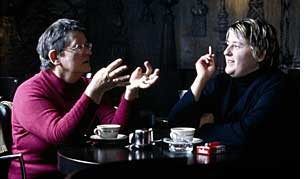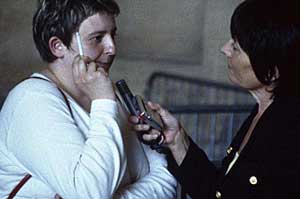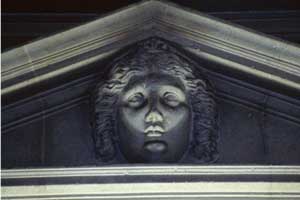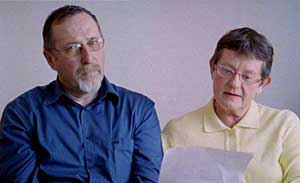
 |
||||||
|
GAY
FILM REVIEWS BY MICHAEL D. KLEMM
|
||||||
|
Beyond
Hatred First Run Features Director/Screeenplay Unrated, 85 minutes |
Family
Values
Beyond Hatred is a remarkable 2005 French documentary that examines a tragic gay bashing and its aftermath. Francois Chenu was in the wrong place at the wrong time when three vicious skinheads were "cruising" Leo Lagrange Park in Rheims, looking for an Arab to assault. When they couldn't find one, they decided that a fag would do just as well and beat young Francois into unconsciousness before throwing him into a pond where he drowned. |
 Filmed
in cinema-verite style, director Olivier Meyrou allows the facts to gradually
reveal themselves. Unlike crime shows on cable television, the principals
are not identified, there is no explanatory narration, the camera does not
intrude into the courtroom, and there are no sensational re-enactments.
Instead, Meyrou aspires to capture something more visceral on celluloid.
His camera eavesdrops on discussions between the attorneys, social workers
and, most importantly, documents the Chenu family's sorrow and their noble,
yet frustrated, attempts to understand how the killers' racist and xenophobic
upbringings could result in such pointless, and hate-fueled, violence. Filmed
in cinema-verite style, director Olivier Meyrou allows the facts to gradually
reveal themselves. Unlike crime shows on cable television, the principals
are not identified, there is no explanatory narration, the camera does not
intrude into the courtroom, and there are no sensational re-enactments.
Instead, Meyrou aspires to capture something more visceral on celluloid.
His camera eavesdrops on discussions between the attorneys, social workers
and, most importantly, documents the Chenu family's sorrow and their noble,
yet frustrated, attempts to understand how the killers' racist and xenophobic
upbringings could result in such pointless, and hate-fueled, violence. |
|
|
|
|
 But,
despite their willingness to listen, the Chenus are not Mother Theresa.
"I'd like to have retained my anger forever, "the mother remarks at one
point. Ponder too the sister's anger after hearing the courtroom defense.
"I can't accept that asshole putting on a 45-minute show!" she snarls, "I
know they have to defended. It's one of our freedoms, and part of our law,
and we'd be like them if we didn't allow that." But where is their
remorse? she asks. Powerful scenes like this permeate the film. Emotions
are raw, yet the ending can almost be called uplifting when Francois' parents
write a letter to the killers in prison, bestowing far more compassion than
the letter's recipients showed their son. "You denied his humanity," they
write, "thus betraying your own." But,
despite their willingness to listen, the Chenus are not Mother Theresa.
"I'd like to have retained my anger forever, "the mother remarks at one
point. Ponder too the sister's anger after hearing the courtroom defense.
"I can't accept that asshole putting on a 45-minute show!" she snarls, "I
know they have to defended. It's one of our freedoms, and part of our law,
and we'd be like them if we didn't allow that." But where is their
remorse? she asks. Powerful scenes like this permeate the film. Emotions
are raw, yet the ending can almost be called uplifting when Francois' parents
write a letter to the killers in prison, bestowing far more compassion than
the letter's recipients showed their son. "You denied his humanity," they
write, "thus betraying your own." |
|
 Aside
from a few photographs, Francois - like Matthew Shepard in The Laramie
Project - does not appear in the film, nor is his killing staged for
the cameras. Meyrou's approach engages the theater of the mind. Consider
this lengthy scene: Francois' sister is allowed a long monologue during
which she recounts reading in the papers that a young man was found beaten
to death in Rheims. She drove there, knowing in her gut that it's her brother,
and discovered that she was correct. She then describes his attack. Her
speech, pregnant with long pauses, is accompanied by a static, unbroken
shot of the empty park where her brother was killed. (See picture at top
of essay.) Occasionally a jogger or two runs by, and it grows dark in the
last minutes. A more conventional director might have added flashes of violence
but this minimalist approach forces the mind to create its own images. The
effect is more powerful than any re-enactment could ever be. Aside
from a few photographs, Francois - like Matthew Shepard in The Laramie
Project - does not appear in the film, nor is his killing staged for
the cameras. Meyrou's approach engages the theater of the mind. Consider
this lengthy scene: Francois' sister is allowed a long monologue during
which she recounts reading in the papers that a young man was found beaten
to death in Rheims. She drove there, knowing in her gut that it's her brother,
and discovered that she was correct. She then describes his attack. Her
speech, pregnant with long pauses, is accompanied by a static, unbroken
shot of the empty park where her brother was killed. (See picture at top
of essay.) Occasionally a jogger or two runs by, and it grows dark in the
last minutes. A more conventional director might have added flashes of violence
but this minimalist approach forces the mind to create its own images. The
effect is more powerful than any re-enactment could ever be. |
|
 There
are many similar scenes in Beyond Hatred,
and these are contrasted with several wordless sequences in which the images
speak for themselves. In one, the father just stares into space, his face
pained, followed by a close-up of the sister; she is in the shower, her
eyes are closed, and water runs down her face. In another, the mother paces
back and forth while working in the kitchen. There is a chilling moment
near the end when the father of one of the killers walks out from the courtroom
and past everyone without a word, looking very small, and insignificant,
as he descends the stairs on his crutches. There
are many similar scenes in Beyond Hatred,
and these are contrasted with several wordless sequences in which the images
speak for themselves. In one, the father just stares into space, his face
pained, followed by a close-up of the sister; she is in the shower, her
eyes are closed, and water runs down her face. In another, the mother paces
back and forth while working in the kitchen. There is a chilling moment
near the end when the father of one of the killers walks out from the courtroom
and past everyone without a word, looking very small, and insignificant,
as he descends the stairs on his crutches. |
|
|
There are questions but no answers. Two worlds meet in the courtroom but in the end there is no closure. There will always be hatred but director Meyrou documents that there is also hope when the victims try to look past the emnity and show compassion. And goodness knows, we need more of that in the world today. Beyond Hatred is both a chilling, and inspiring, film. In French, with English subtitles.
|
|
 Beyond Hatred is a First Run Features release. Click here to purchase this title Click The Banner To View First Run's Other Gay/Lesbian Titles |